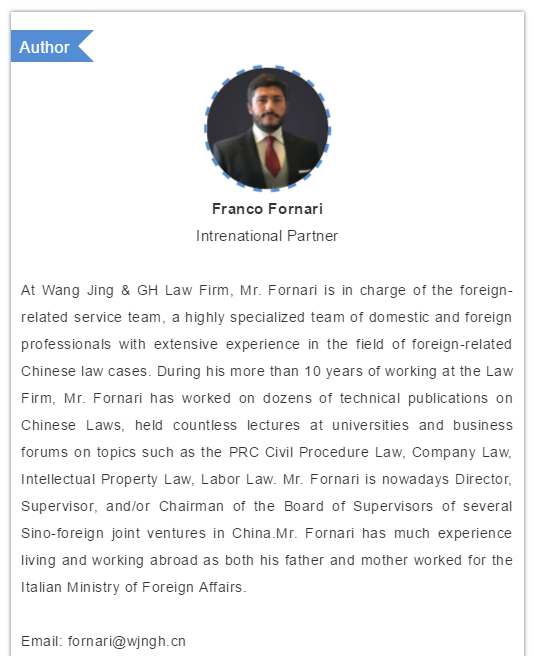This article aims to illustrate to the esteemed reader the main legal instruments of preserving credit made available to the parties in civil litigation or arbitration in the People's Republic of China. This paper offers a practical point of view of the tools available to the parties, including freezing the defendant's bank account and emigration restriction for a company's legal representative.
Wang Jing & GH Law Firm is a flagship Law Firm of civil and commercial litigation in South China, with daily activities in all main Chinese courts, representing its esteemed clients worldwide. We are pleased to share with our respected readers, our direct experience and practice in this specific field of Chinese civil procedural law.
The transformation of the legal system in the People's Republic of China into a formalized system of law was followed by a reforms policy in the judicial protection of the parties' rights, inter alia through the legal system's improvement and the judicial system. Over the years, fundamental principles, such as the principle of legality and the rule of law, have been introduced into the legal system, with a progressive increase in the courts' efficiency and the skill level of the officers in judicial departments. Today, the Chinese legal system offers different ways of dispute resolution, including negotiation, conciliation or mediation – judicial and extrajudicial – arbitration, judicial proceedings, and in some limited cases, administrative proceedings.

During a dispute, if the parties are unable to find a settlement out of court before bringing it in front of a judge, they should ask themselves the following questions:
- Who are the parties involved?
- What is the cause of the dispute concerned?
- What is the amount of the claim?
- Which is the competent court?
- Is it necessary to apply for the preservation of the defendant's property?

Upon such fundamental matter, this writing will focus below.
Property preservation is a measure of prevention that is granted when the creditor has a well-founded fear of losing his guarantee in the claim. This measure aims to prevent the debtor from disposing of his assets while awaiting a pecuniary sentence likely to give rise to an attachment, making it impossible to achieve.
As for other Western judicial systems, the fundamental principles which guide the measure of property preservation are the periculum in mora, id est the fear of losing the assets guarantee, and the fumus boni iuris, id est the probable existence of the right for which protection is sought.
Chinese Civil Procedure Law provides that, before or during civil litigation, the plaintiff may request the court to seize the defendant's assets in advance to ensure that he receives what he is entitled to have in case he wins the dispute. To make such claims, Art. 100 para. 2 and Art. 103 of the Chinese Civil Procedure Law states that the plaintiff must provide the court with a guarantee or deposit if such action causes an unfair economic loss to the defendant or any other party.
The applicant's request for property preservation may be submitted, either as a preliminary action, before the case registration, or during the proceedings at the first or second instance.
In the first case, the requesting party must necessarily initiate judicial or arbitral proceedings within 30 days from the order of attachment issued by the court seized. If this does not happen, the court will revoke the ruling, and the plaintiff may be held liable for any damages caused to the defendant if:
I. The application for property preservation has been submitted to the court by mistake or by fraud;
II. The commitment to the trial request submitted by the plaintiff was not granted.
According to the nature and characteristics of the property, the preservation often takes the form of sealing up, distaining or freezing, by which any future transfer, removal, or alteration of such assets without prior approval from the court will be restrained. The most common measures are acted upon:
- Bank account
The court issues a preservation notice for the bank demanding to freeze the defendant's bank account. The bank, therefore, has a legal obligation to assist the court to freeze the specified amount for a certain period (usually is 1 year and may be extended at the applicant's request). The bank will release the frozen bank account only upon receipt of a notice for release from the court or expiry of the time limit.

- Chattels
The court can place seals which state "sealed by [xxx] People's Court on [date]." In the case of a property with a registered title (e.g., vehicles), the court requires the registration authority to freeze any transfer of ownership of the property and that the owner surrenders the title document. Where necessary, the court can proceed with the seizure of the property. The time limit for this measure is 2 years and can be extended upon request. For perishable goods, the court can order the sale and seize the profit from it afterwards.
- Land and real estate
The court can seal land or buildings by placing seals stating, "sealed by [xxx] People's Court on [date]." The preservation notice of the court is delivered to the competent authority in order to freeze the transfer or the mortgage of the property. Moreover, the court can demand the seizure of the title document. Land and real estate rights can be frozen for up to 3 years, which can be extended for up to another three years upon application.


- Shares and bonds of listed companies
The court issues a preservation notice to the stock exchange on which the shares and bonds of the company will be subject to the preventive measure in transfer or trading. The time limit for freezing stocks and bonds is one year, and it can be extended upon request (each extension has a limit of 6 months, but there is no maximum limit on the number of attachments).
- Equity interest in a private company
The court can issue a preservation notice to both the company and the State Administration for Market and Regulation (SAMR), demanding to suspend the company's registration for equity transfer. Usually, the time limit for this type of measure is 2 years.
- Restriction on emigration and seizure of passport
Art. 8 of the Law of the People's Republic of China on the Control of the Exit and Entry of Citizens, point 2 states that following the notification by a People's Court, permission to leave the country shall not be granted (inter alia) to persons involved in an unresolved civil case.

On October 17th, 2016, the PRC Supreme People's Court published the Provisions on Several Issues concerning the Handling of Property Preservation Cases by the People's Courts (“Provisions”) by which it introduces the terms of approval and execution for the property preservation and the guarantees to be presented to the court by the applicant into the Chinese legal system.
Art. 5 of the Provisions states that in order to apply for property preservation, the plaintiff has to present to the court a guarantee that shall not exceed 30% of the preservation amount requested or the value of such disputed subject matter. This statement made easier for the plaintiff to apply for property preservation. Before it, the courts asked for stricter requirements, which could also be the same amount of the property subject to the seizure.
After receiving the application of property preservation, the People's Court will decide within 5 days, as provided in Art. 4 of the Provisions. If the court deems it necessary for the applicant to present a guarantee, it will rule within 5 days of the guarantee being provided. Whereas in an emergency, the order will be issued within 48 hours.
In practice, the applicant can provide a guarantee to the court in one of the following ways:
1. Cash deposit
By depositing an amount of cash or other fungible assets, or making available to the court a real asset located in the territory of the People's Republic of China, on which to register a mortgage (as per Art. 5 of the Provisions, it shall not exceed the 30% of the value of the seized asset);
2. Guarantor
Invoking a third party who will act as a guarantor;
3. Letter of Guarantee
Art. 8 of the Provisions states that where a qualified financial institution provides a guarantee for the applicant's property preservation request in the form of an independent guarantee letter, the court shall allow it. However, it should be noted that over time banks have become increasingly reluctant to grant such instruments since they are directly reflected in their balance sheets;
4. Litigation Property Preservation Liability – LPPL
An insurer provides the guarantee for property preservation in the form of a property preservation liability insurance contract concluded with the property preservation applicant. It shall provide a letter of guarantee to the court as per Art. 7 of the Provision. The letter shall indicate that the insurer will undertake to indemnify the defendant's damages if he shows that has suffered an unfair economic loss.
The China Insurance Regulatory Commission authorized LPPL insurance for the first time in a trial in Yunnan Province in 2012, and since then, more and more courts have begun to accept this guarantee instrument until 2016, the Supreme People's Court legally recognized it as part of the Provisions.

Today this instrument is usually used in corporate law disputes concerning share capital, specifically, about shareholder capital contribution, equity ownership confirmation, equity transfers, and shareholder rights.
The legal risks in LPPL insurance are more complex than traditional liability risks in China so that the insurer will examine the object of protection, the insured party, and the nature of the litigation closely.
For both the Government and the courts of the People's Republic of China, LPPL insurance is a very favorable solution as it helps to promote and preserve justice. This guarantee instrument has proved to be in practice more convenient than the guarantee from a bank, as it allows the plaintiff to benefit from the measure of property preservation even if it is not in a wealthy financial situation.
For these reasons, the LPPL insurance market has seen strong growth in recent years, and most Chinese insurance companies now offer this type of service. In addition, the development of competition in this market has led to a steady reduction in insurers' premiums.
For the cases stated in Art. 9 of the Provisions, the applicant can request property preservation without having to ensure any guarantee to the court:
1- Recovery of alimony, maintenance expenses, tending expenses, pension, medical expenses, labor remuneration, employment injury compensation, and traffic accident personal injury compensation;
2- The party involved suffers domestic violence in a marital or familial dispute case and has financial difficulties;
3- A public interest lawsuit filed by a procuratorate which involves compensation for damages;
4- The party involved claims compensation for the damages caused by his/her courageous act;
5- Where the facts of the case are clear, and the rights and obligation are specific, thus there is a relatively slim possibility of incorrect application of property preservation; or
6- The applicant is a financial institution with independent solvency (established with approval from the financial regulatory authorities), such as a commercial bank, an insurance company, and its branches.
The Provisions also provides measures to protect the interests of the defendant. Art. 13 states that if the party is liable to the property preservation with multiple assets, the court shall order the seizure of the assets that has a relatively minor impact on its productive and commercial activity (such as factories, machinery, or equipment), which would allow the defendant to continue to use these assets, ensuring their safe storage and preventing the deterioration. If, on the contrary, the court freezes a bank account, it will have to specify the actual amount which will be frozen and therefore will not be at the defendant's disposal. The excess part of the credit balance will still be available to the account holder.

It is possible to request the revocation of the measure of preservation as per Art. 23 of the Provisions, where a court has adopted property preservation measures, under any of the following circumstances, the applicant shall promptly apply for the lifting of it:
1. It has not filed a lawsuit or applied for arbitration according to the relevant laws within 30 days after the adoption of the pre-trial property preservation measures;
2. The arbitration commission does not accept the application for arbitration or allows for the withdrawal of the application of arbitration;
3. The court does not accept the lawsuit or allows for the withdrawal of the lawsuit;
4. A valid judgment of another court rejects the lawsuit or litigation request; or
5. Any other condition where the applicant for property preservation should apply for lifting of property preservation.
Upon receipt of an application for lifting a property preservation, the court shall rule on it within 5 days. However, under urgent circumstances, the court shall rule within 48 hours. Where the applicant for property preservation fails to apply to the court promptly for lifting the preservation measure, the applicant might be responsible of related compensation. The compensation to be made to the party suffered losses during the course of property preservation. The party subject to the preservation can also apply for the revocation of the measure, and, in this case, the court also shall rule on lifting it within the period mentioned above. This provision, as well as the request for a guarantee from the plaintiff, are protective measures to discourage abuses of this precautionary measure.
The right to allow such interim relief in the People's Republic is reserved exclusively for the Chinese courts. During arbitration proceedings (within Continental China), property preservation request must be submitted to the arbitration committee, which will then be forwarded to the competent Chinese court. The Chinese courts do not grant provisional measures for arbitrations outside Continental China (excluding Hong Kong) as well as for arbitration proceedings initiated outside the territory of Continental China.
The benefits of adopting property preservation are clear; indeed, it is essential to deter the counterparty to bring or be part of a lawsuit to defer his financial obligation over time, moreover, it is a valuable legal mean for all those cases where there is a real risk of loss of the debtor's assets.
We hope that this paper has taken your interest and offered you with useful tools to evaluate with your law firm in case of future litigation in the People's Republic of China.
Wang Jing & GH Law Firm represents hundreds of esteemed clients every year in a civil lawsuit in the main Chinese courts. Debts collections, commercial disputes, enforcement of judgments, and arbitration awards are part of our daily practice. Feel free to contact us in case you require our expertise or just for further information.





